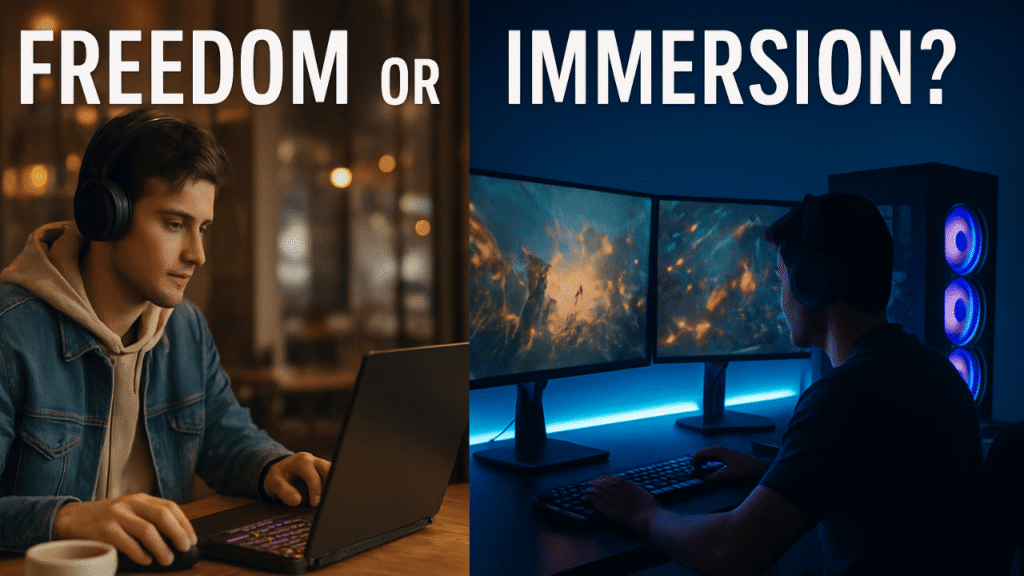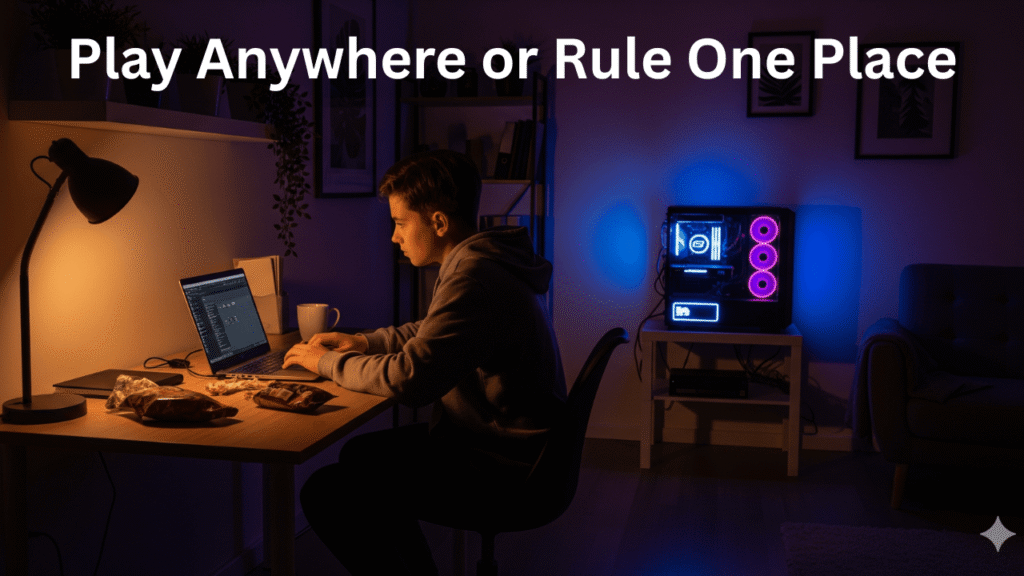Introduction
Imagine standing at a train station as two locomotives thunder past—one sleek and built for speed, the other massive, steady, and unstoppable. Both promise the same destination, yet the journey they offer feels entirely different. That’s the unspoken tension many gamers wrestle with when choosing between laptop gaming vs desktop setups.
For some, a gaming laptop is freedom embodied—the ability to slip a digital world into a backpack and carry it across borders, dorm rooms, and late-night cafés. It’s the whisper of possibility: play anywhere, anytime. For others, a desktop is not just hardware but a statement of permanence, a cathedral of glowing fans and raw power that becomes part of a room’s identity. It doesn’t travel; it anchors you, grounding your hours in a single space where time itself seems to dissolve.
This decision matters more than ever in 2025, when performance leaps and lifestyle shifts make the divide sharper but also more personal.
The decision between laptop gaming vs desktop setups is more than hardware—it’s about how you want to experience gaming. Both carry unique strengths, shaping how players interact with digital worlds. This choice reflects lifestyle, identity, and commitment, making it a deeply personal decision in today’s gaming culture.
Laptop Gaming vs Desktop: A Quick Snapshot
At its core, the debate splits into two experiences: one that values freedom and one that values dominance. A laptop lets you carry your universe in a bag, while a desktop turns a corner of your room into a permanent command center. Both are capable of handling modern titles, but the way they deliver that power couldn’t be more different.
Those who lean toward laptop gaming often balance work, study, and play on a single machine. Meanwhile, desktop loyalists usually crave uncompromised performance and enjoy the ritual of sitting down at a fixed setup. Each path appeals to a different type of gamer, and recognizing which camp you fall into is the first step toward making the right choice.
Understanding laptop gaming vs desktop comparisons begins with lifestyle needs. Laptops thrive on portability, while desktops excel in raw consistency. Students, travelers, and flexible gamers may lean toward laptops, while dedicated players often choose desktops for stability. Recognizing your priorities helps clarify which system better aligns with your gaming goals.
When comparing laptop gaming vs desktop setups, the choice often comes down to whether portability outweighs the raw power of a fixed system.

Performance Face-Off: Speed, Graphics, and Raw Power
When it comes to raw muscle, desktops still set the pace. Their larger chassis house full-size GPUs and CPUs, often running cooler and faster than their portable rivals. Laptop gaming vs desktop performance benchmarks consistently show desktops leading in raw power, though laptops are catching up with optimized GPUs. Games load quicker, textures appear sharper, and frame rates stay stable even under heavy demand. For those who value immersion, these differences aren’t minor—they define the experience.
Gaming laptops, however, have made incredible strides. Today’s slim machines feature dedicated graphics cards, efficient cooling designs, and turbo-boosted CPUs that would have seemed impossible a decade ago. Yet even the best struggle against the thermal limits of a portable form. Overclocking on a laptop remains risky, while desktops embrace it with ease. The result? Desktop rigs still deliver a more consistent level of performance for marathon gamers chasing every frame.
The decision between laptop gaming vs desktop setups is more than hardware—it’s about how you want to experience gaming. Both carry unique strengths, shaping how players interact with digital worlds. This choice reflects lifestyle, identity, and commitment, making it a deeply personal decision in today’s gaming culture.
For many gamers, the performance gap in laptop gaming vs desktop systems decides whether they invest in mobility or maximum frame rates.
Portability vs. Permanence: Lifestyle Choices That Define Gamers
The greatest strength of laptop gaming vs desktop setups lies in mobility.The lifestyle trade-off in laptop gaming vs desktop often reflects whether a gamer values flexibility over building a permanent gaming station. Imagine finishing work in a coffee shop, then diving into Cyberpunk 2077 without missing a beat. That kind of seamless transition is only possible with a laptop, where your game library follows you everywhere. It becomes not just a device, but a travel companion.
Desktops, in contrast, invite permanence. They don’t bend to your movements—they command you to settle in. The glowing fans, the wide display, the steady hum of power—it all creates a ritual around gaming that many find irreplaceable. While laptops symbolize flexibility, desktops embody rootedness, turning a room into a personal sanctuary where every session feels intentional. Both reflect identity as much as they deliver performance.
Understanding laptop gaming vs desktop comparisons begins with lifestyle needs. Laptops thrive on portability, while desktops excel in raw consistency. Students, travelers, and flexible gamers may lean toward laptops, while dedicated players often choose desktops for stability. Recognizing your priorities helps clarify which system better aligns with your gaming goals.
Price Breakdown: Which Offers More Value for Money?
Desktops often look more expensive at first glance, but their longevity and upgrade paths make them a smarter long-term investment.When looking at laptop gaming vs desktop costs, desktops may seem expensive upfront, but their upgrade options make them more cost-effective in the long run. Replace a single component, and your machine stays relevant for years. In contrast, laptops tend to age faster, with fewer ways to keep them cutting-edge.
Still, value isn’t only about longevity. For budget-conscious gamers, laptops combine portability with solid performance, often bundling features like screens, keyboards, and webcams that desktops require separately. Yet hidden costs lurk—battery replacements, limited repair options, and premium pricing for thin designs. When comparing laptop gaming vs desktop setups, the best option depends on whether you want the lowest upfront price or the most mileage for every dollar.
Cost is always central in the laptop gaming vs desktop decision. Laptops appear affordable upfront but may require earlier replacements. Desktops, though pricier initially, last longer through upgrades. Accessories, repairs, and energy use also influence long-term value. Choosing wisely depends on balancing present affordability against future adaptability and sustained performance.

Upgrade Potential and Longevity
One of the clearest differences is upgradeability. A desktop thrives on modularity—you can swap GPUs, add RAM, or install better cooling without replacing the entire system. This keeps it adaptable, stretching its lifespan far beyond the average laptop.
But laptops aren’t standing still. Some now feature modular GPUs or memory slots, narrowing the gap between portable and stationary power. Even so, these upgrades remain limited compared to desktops. Longevity in laptops often comes down to resale value: a premium portable rig can still hold appeal a few years later, even if its internals can’t be refreshed. The desktop, however, continues to evolve with you, making it a true long-term companion.
When analyzing laptop gaming vs desktop longevity, desktops clearly stand taller. Modular builds allow easy upgrades that extend performance over time. Laptops offer minimal improvements—typically RAM or storage—and resale becomes the fallback. Still, modern high-end laptops narrow the gap. The difference lies in whether you want evolving power or portable reliability.
Laptop gaming vs desktop debates often highlight upgrade potential, with desktops winning hands-down for gamers who plan to extend system lifespan.
Gaming Experience Beyond Specs
Numbers don’t tell the whole story. A desktop paired with a 32-inch monitor feels vastly different than a laptop with a 15-inch screen, even if they share the same GPU. Larger displays, higher refresh rates, and surround sound setups transform a desktop session into something more cinematic and all-consuming. Laptop gaming vs desktop displays reveal clear differences—desktops dominate with ultra-wide monitors, while laptops prioritize compact convenience.
Laptops, however, shine in personal immersion. Built-in displays with stunning color accuracy, powerful onboard speakers, and the intimacy of playing inches from the screen create a unique vibe desktops can’t replicate. Ergonomics play a role too: a desktop lets you customize chairs, desks, and accessories, while laptops demand flexibility. Experience is often what tips the scale when comparing laptop gaming vs. desktop—not specs alone.
The essence of laptop gaming vs desktop setups is felt, not measured. Monitors, sound, and comfort shape the immersion more than raw specs alone. Desktops provide cinematic spaces with expansive displays, while laptops deliver intimate sessions anywhere. These differences affect how players emotionally connect with games beyond technical performance.

The Future of Laptop Gaming vs Desktop
Cloud technology is rewriting the rules of portability. Services like GeForce Now and Xbox Cloud Gaming allow high-end performance on modest laptops, blurring the old power divide. The portability of laptops, paired with cloud rendering, could shift the balance in their favor within the next decade.
Yet desktops won’t vanish. They remain the backbone for enthusiasts who demand uncompromised hardware and bleeding-edge customization. With AI-driven optimization, smarter cooling, and next-gen silicon, desktops will continue pushing boundaries in ways laptops can’t yet sustain. The future of laptop gaming vs desktop isn’t about one replacing the other—it’s about both evolving into distinct ecosystems that serve different kinds of players.
Looking ahead, the debate around laptop gaming vs desktop grows more nuanced. Cloud gaming may give laptops unexpected dominance, while desktops will remain benchmarks for power-hungry players. AI-driven optimization, cooling breakthroughs, and portable innovations will transform both paths. The future promises not replacement, but coexisting ecosystems for different gamer identities.
Pros and Cons Table (Quick Reference)
| Feature | Gaming Laptop | Gaming Desktop |
|---|---|---|
| Portability | Excellent – play anywhere | Poor – fixed to one space |
| Performance | Strong but limited by thermals | Unmatched power and stability |
| Price Value | Lower upfront, fewer upgrades | Higher upfront, better longevity |
| Upgrade Potential | Minimal to moderate | Extensive and modular |
| Lifespan | 3–5 years on average | 5–10 years with upgrades |
| Experience | Intimate and flexible | Immersive and cinematic |
A pros and cons look at laptop gaming vs desktop makes differences easier to grasp. Laptops shine in flexibility but falter in upgrades. Desktops win in customization but lack mobility. Viewing trade-offs side by side helps readers instantly see which setup complements their goals, lifestyle, and gaming expectations best.

FAQs
Is laptop gaming as powerful as desktop gaming in 2025?
Laptops now rival mid-tier desktops, but full-size rigs still dominate in sustained power and cooling efficiency.
Which lasts longer, a gaming laptop or a desktop?
Desktops often last twice as long thanks to easy upgrades, while laptops average three to five years of peak performance.
Do desktops really save money in the long run?
Yes, because modular upgrades prevent full system replacements, spreading costs more efficiently over time.
Can a laptop ever match desktop-level performance?
High-end laptops get close, but thermal limits keep desktops in the lead for extreme gaming sessions.
Which is better for casual vs. professional gaming?
Casual players benefit from the flexibility of laptops, while professionals and streamers typically rely on desktops for maximum stability and performance.
Readers often compare laptop gaming vs desktop when asking practical questions. They want to know about lifespan, value, performance, and suitability for different playstyles. Addressing these concerns with clarity helps players find answers quickly, while also reinforcing how this decision remains personal, technical, and lifestyle-driven all at once.
Conclusion: Choosing the Machine That Reflects You
Choosing between laptop gaming vs desktop isn’t really about specs—it’s about identity. Do you see yourself as the kind of player who values movement, the thrill of carrying your world anywhere you go? Or do you crave permanence, where a single room transforms into your digital universe?
Neither choice is inherently better; each one amplifies a different lifestyle. Your decision will reveal more about your gaming identity than your budget or benchmarks ever could.
Choosing between laptop gaming vs desktop setups isn’t about winning or losing—it’s about alignment. Laptops suit those who move often, while desktops reward permanence and power. Your decision reflects not just gaming style but personal identity. The right choice makes every play session feel naturally aligned with who you are.


2 thoughts on “Laptop Gaming vs Desktop: Which One Truly Wins in 2025?”
Comments are closed.